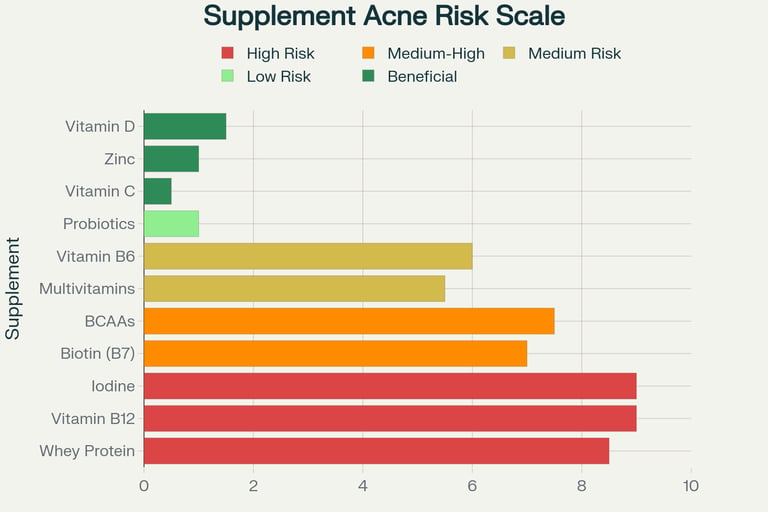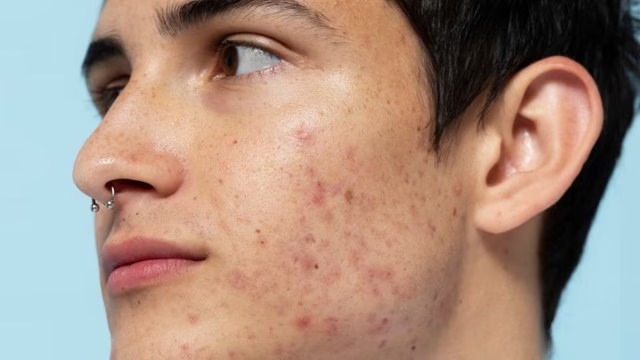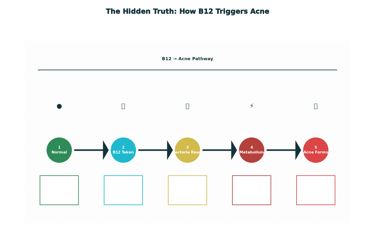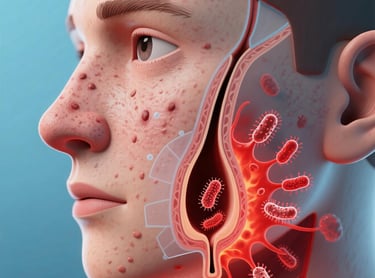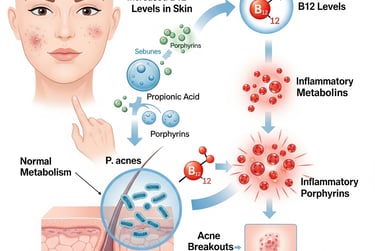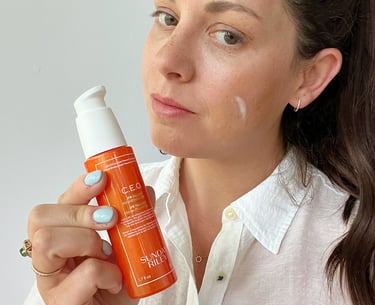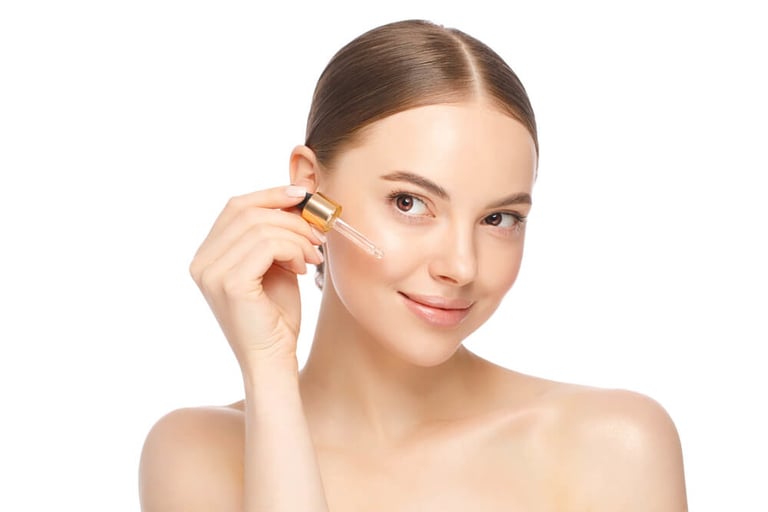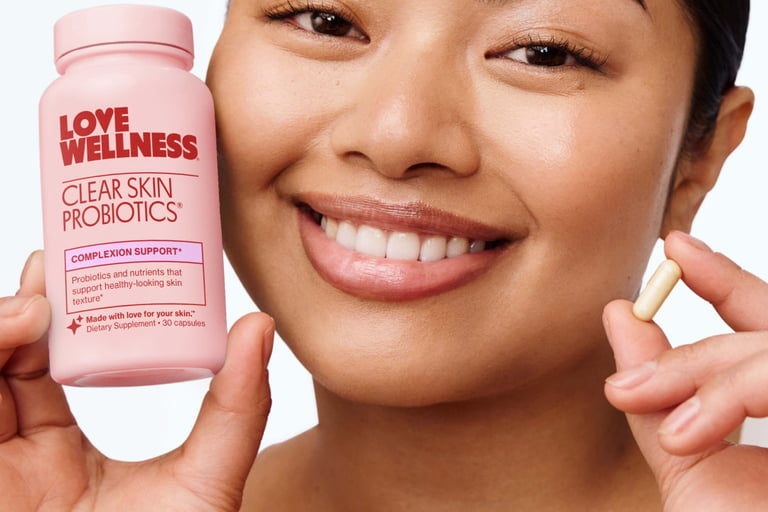The Shocking Truth: How Your Daily Vitamins Could Be Sabotaging Your Skin
What if the supplements you're taking to get healthier are actually causing your acne breakouts? Recent groundbreaking research reveals that over 40% of adults taking certain vitamin combinations experience skin flareups—yet most people have no idea their "healthy" habits are working against them. Here's the surprising science behind vitamin-induced acne and how PharmaguIde.io's AI-powered platform can help you optimize your supplement stack for clearer, healthier skin.
Sean Cheick
9/3/20259 min read
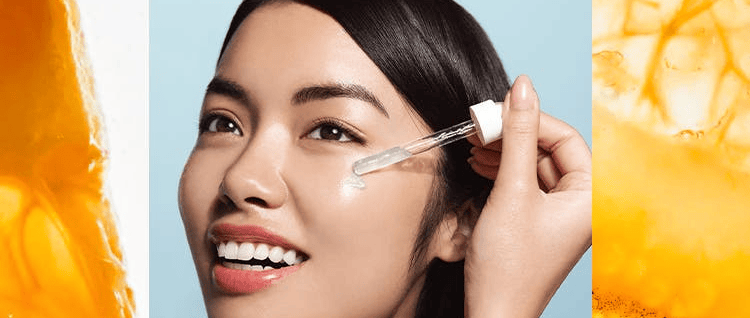

The Hidden Vitamin-Acne Connection Most People Don't Know About
Close-up of forehead showing acne with inflamed pimples and rough skin texture
You've probably heard that vitamins are universally good for you. But when it comes to acne-prone skin, this couldn't be further from the truth. The reality is that specific vitamins can either dramatically improve your complexion or trigger devastating breakouts—and the difference often comes down to dosage, timing, and dangerous interactions most people never consider.
Recent clinical studies have uncovered startling connections between common supplements and skin health that completely flip conventional wisdom on its head. For instance, did you know that vitamin B12 supplements can trigger acne in up to 10% of users—not through hormonal pathways like most people assume, but by literally reprogramming the behavior of bacteria living on your skin?
Here's the jaw-dropping mechanism: When you take B12 supplements, the excess vitamin reaches your skin through your bloodstream. The acne-causing bacteria Propionibacterium acnes (P. acnes) normally produces its own B12 from L-glutamate. But when it detects high levels of B12 in your skin, it shuts down its own production and redirects that L-glutamate toward creating porphyrins—inflammatory compounds that damage skin cells and trigger the exact inflammatory cascade that creates painful, persistent acne.
]The surprising mechanism: B12 supplements disrupt skin bacteria metabolism, leading to inflammatory acne breakouts
This isn't just theoretical—UCLA researchers documented this exact process in real time, watching as participants developed acne within one week of B12 supplementation. Even more shocking: the acne continued for 12 weeks after stopping the vitamin, because your skin bacteria needed time to readjust their metabolism.
The Supplement Acne Risk Scale: Know Before You Glow
Not all supplements are created equal - some can trigger acne while others help heal it
Not all supplements are created equal when it comes to skin health. After analyzing dozens of clinical studies, we've identified the exact risk profile for popular vitamins and supplements. The results will shock you:
High-Risk Supplements (Avoid If Acne-Prone):
Vitamin B12: The biggest culprit. Doses above 10mg per week can trigger acne through the porphyrin pathway described above. This includes most multivitamins and B-complex supplements.
Iodine: Consumed in excess (over 150mcg daily), iodine is excreted through your skin, causing direct irritation and inflammatory acne. Most people already exceed this limit through dairy, seafood, and iodized salt—then add more through supplements.
Whey Protein: This isn't just about dairy sensitivity. Whey protein specifically increases insulin-like growth factor 1 (IGF-1) by up to 300%, which directly stimulates sebaceous glands to produce more oil while increasing skin cell turnover—a perfect storm for clogged pores.
Biotin (B7): The "hair, skin, and nails" vitamin can actually worsen acne by interfering with vitamin B5 absorption. B5 helps regulate oil production, so when biotin blocks it, your skin becomes more oily and acne-prone.
Medium-Risk Supplements (Use With Caution):
BCAAs and Pre-Workout Supplements: These increase IGF-1 and insulin responses, promoting oil production. The caffeine content can also increase cortisol (stress hormone) levels, further aggravating acne.
Multivitamins: Most contain a cocktail of acne-triggering ingredients—B12, biotin, and iodine—in doses that individually might be safe but become problematic in combination.
Skin-Healing Supplements (Actually Beneficial):
Zinc: The gold standard for acne supplements. Clinical studies show 30-40mg daily reduces inflammatory lesions by up to 49% through multiple mechanisms: reducing oil production, fighting acne bacteria, and calming inflammation.
Vitamin D: People with severe acne have significantly lower vitamin D levels. Supplementation (1000-4000 IU daily) helps regulate immune function and reduces the inflammatory response that drives acne formation.
Vitamin C (Topical): While oral vitamin C has minimal acne benefits, topical application is clinically proven to reduce acne lesions, fade post-inflammatory hyperpigmentation, and support collagen production for smoother skin texture.
The Vitamin A Paradox: Miracle or Menace?
Here's where things get really interesting—and confusing. Vitamin A represents the ultimate paradox in acne treatment: it's simultaneously one of the most effective acne treatments and one of the most dangerous supplements you can take.
The Miracle Side: Topical retinoids (vitamin A derivatives) are considered the gold standard of acne treatment, with decades of research proving their effectiveness. They work by:
Increasing cell turnover to prevent clogged pores
Reducing inflammation
Regulating sebum production
Healing acne scars through collagen stimulation
The Menace Side: Oral vitamin A supplementation becomes toxic at surprisingly low levels. The tolerable upper limit is just 3,000 RAE (about 10,000 IU) daily, but many acne sufferers mistakenly take 25,000+ IU thinking "more is better".
Vitamin A toxicity symptoms include: dry, cracked skin that's often mistaken for "purging," hair loss, brittle nails, and paradoxically, worsening acne. The most shocking case in medical literature involved a woman who took 3.5 million IU daily for psoriasis—she developed severe liver damage and complete hair loss, though her skin initially appeared to improve.
The key insight: Vitamin A works best when applied topically at therapeutic concentrations, not when taken orally at high doses. This is exactly the kind of nuanced information that PharmaguIde.io's AI can help you navigate safely.
The Accutane Interaction Nobody Talks About
If you're taking or considering Accutane (isotretinoin), here's a critical fact most dermatologists don't emphasize: combining Accutane with vitamin supplements can create dangerous interactions.
Accutane itself is a high-dose vitamin A derivative, so taking additional vitamin A supplements can quickly push you into toxic territory. But here's the shocking part—research shows that Accutane actually depletes your body's B12 and folate levels over time, potentially creating deficiencies that require careful supplementation.
This creates a complex balancing act: you need to avoid excess vitamin A while potentially needing B12 supplementation—but B12 can trigger acne. It's precisely these kinds of complex interactions that make professional guidance essential.
Topical vs. Oral: The Route That Changes Everything
One of the most eye-opening discoveries in recent dermatology research is how dramatically the route of administration affects vitamin efficacy for skin health. The same vitamin can be miraculous topically and useless—or even harmful—when taken orally.
Vitamin C: The perfect example. Oral vitamin C has minimal direct acne benefits, but topical vitamin C is clinically proven to:
Reduce acne lesions by 32% compared to placebo
Fade post-inflammatory hyperpigmentation
Stimulate collagen production for smoother skin texture
Provide antioxidant protection against environmental damage
Vitamin E: Another route-dependent vitamin. Oral vitamin E shows limited acne benefits and may even clog pores in oily skin types. But topical vitamin E, especially when combined with vitamin C, provides antioxidant protection and may help with acne-related inflammation.
The mechanism: When you take vitamins orally, they're diluted throughout your entire bloodstream and may never reach therapeutic concentrations in your skin. Topical application delivers active ingredients directly where they're needed, at concentrations that can actually affect cellular processes.
The Deficiency-Acne Connection You've Never Heard About
While everyone focuses on supplement-induced acne, there's an equally important flip side: nutrient deficiencies that directly cause or worsen acne. Recent studies reveal shocking connections between low nutrient levels and severe acne that most people—and even some dermatologists—don't know about.
Zinc Deficiency: Adults with acne have significantly lower zinc levels than those with clear skin. The correlation is so strong that zinc levels actually correspond with acne severity—the lower your zinc, the worse your breakouts.
Vitamin D Deficiency: A 2024 study found that 100% of acne patients had inadequate vitamin D levels. More shocking: vitamin D supplementation as an adjunct to standard acne treatment prevented relapse of inflammatory lesions by 48%.
Selenium Deficiency: Often overlooked, selenium deficiency is linked to increased oxidative stress and inflammation in acne patients. Combined with zinc and vitamin D deficiencies, it creates a "perfect storm" for persistent, treatment-resistant acne.
The catch: These deficiencies are incredibly common—over 50% of adults have suboptimal levels of at least one of these nutrients. But supplementing incorrectly can make acne worse, creating a frustrating cycle where you need the nutrients but can't tolerate the supplements.
The Gut-Skin Axis: The Probiotic Revolution
Here's a connection that's revolutionizing dermatology: your gut bacteria directly influence your skin health. Recent research shows that specific probiotic strains can reduce acne severity by up to 50% by modulating the gut-skin axis.
The mechanism: Gut bacteria produce short-chain fatty acids (SCFAs) that influence systemic inflammation and even affect the behavior of skin bacteria. When your gut microbiome is disrupted—by antibiotics, stress, or poor diet—it can trigger inflammatory cascades that manifest as acne.
Probiotic supplements containing Lactobacillus and Bifidobacterium strains show remarkable promise for acne treatment, but timing and strain selection matter enormously. Taking probiotics with certain antibiotics can render them useless, while specific strains work better for different types of acne.
How PharmaguIde.io Solves the Vitamin-Skin Mystery
Love Wellness Clear Skin Probiotics promote healthy-looking skin texture and complexion support through probiotics and nutrients
This is exactly why we created PharmaguIde.io—to cut through the confusion and provide personalized, AI-powered guidance for optimizing your supplement regimen for healthy skin.
Here's how our platform transforms your approach to vitamins and skincare:
🔍 Interaction Analysis: Our AI instantly identifies dangerous combinations like B12 + biotin that could trigger breakouts, or beneficial synergies like vitamin C + vitamin E that enhance skin protection.
🎯 Personalized Dosing: Based on your age, skin type, current medications, and health goals, we calculate the optimal dose ranges that maximize benefits while minimizing acne risk.
📊 Quality Scoring: Not all supplements are created equal. Our transparency ratings help you choose high-quality, acne-safe formulations from reputable manufacturers.
📸 Smart Scanning: Simply photograph your supplement bottles and medications—our advanced computer vision instantly analyzes everything for potential skin-related interactions.
📈 Symptom Tracking: Monitor how changes to your supplement regimen affect your skin over time, with AI-powered insights that reveal patterns you might miss.
🛡️ Safety Alerts: Get real-time warnings about supplement-drug interactions, especially crucial if you're using topical retinoids or oral acne medications.
👤 Skin-Specific Profiles: Our algorithms consider your unique skin concerns—whether you're dealing with hormonal acne, cystic breakouts, or post-inflammatory hyperpigmentation—to recommend the most effective, safest vitamin combinations.
🤖 24/7 AI Pharmacist: Get instant, evidence-based answers to questions like "Can I take zinc with my birth control?" or "Will this probiotic interfere with my retinoid?"
Your Action Plan: Optimizing Vitamins for Clear Skin
Based on cutting-edge research and clinical evidence, here's your step-by-step protocol for using vitamins to improve rather than worsen your skin:
Step 1: Audit Your Current Supplements
Check all supplements for B12, biotin, iodine content
Calculate total daily intake including fortified foods
Identify potential acne triggers in your current regimen
Step 2: Implement Skin-Safe Supplementation
Add zinc (30-40mg daily) with food to prevent nausea
Ensure adequate vitamin D (get blood levels tested first)
Consider topical vitamin C instead of oral for direct skin benefits
Step 3: Strategic Timing and Combinations
Take potential acne triggers (if necessary) away from other supplements
Combine beneficial nutrients (like vitamin C + E) for synergistic effects
Space out supplements throughout the day for better absorption
Step 4: Monitor and Adjust
Track skin changes for 12+ weeks (the true timeline for supplement effects)
Adjust doses based on results and blood work
Work with healthcare providers for complex cases
Step 5: Consider Professional Guidance
PharmaguIde.io's AI platform launching soon will automate this entire process, providing personalized recommendations based on your unique profile and goals.
The Future of Personalized Skin Health
The relationship between vitamins and skin health is incredibly complex, with individual responses varying dramatically based on genetics, existing health conditions, and lifestyle factors. What works for your friend might be disastrous for your skin.
This is why the future of skincare lies in personalized, AI-powered analysis that considers all these variables simultaneously. PharmaguIde.io represents the next evolution in health optimization—where cutting-edge artificial intelligence meets evidence-based dermatology to help you achieve your best skin safely and effectively.
The bottom line: Your supplements could be the key to clearer skin—or the hidden cause of your persistent breakouts. Understanding the difference could transform not just your complexion, but your confidence and quality of life.
Ready to unlock the secret to supplement-safe skincare? Join the PharmaguIde.io waitlist and be among the first to access AI-powered supplement analysis that puts your skin health first. Because when you know better, you glow better.
This article is for educational purposes only and should not replace professional medical advice. Always consult with healthcare providers and dermatologists before making significant changes to your supplement regimen, especially if you have existing skin conditions or take prescription medications.
Get Early Access: Visit PharmaguIde.io to join our launch waitlist and receive exclusive insights on optimizing your health stack for radiant, clear skin.
